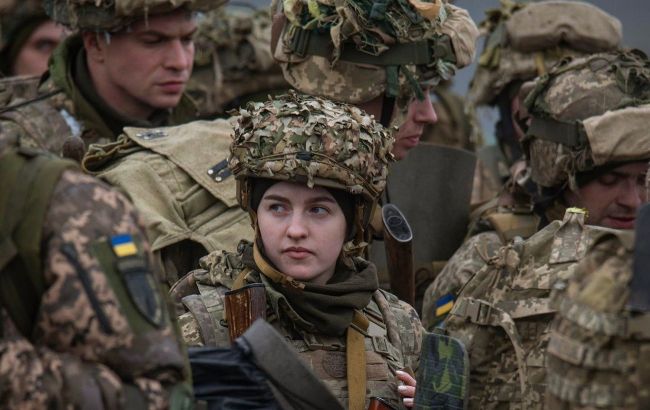Listen to the article
Russian media outlets have launched a new disinformation campaign claiming Ukraine has deployed “female units” to the frontlines in Kupiansk due to manpower shortages, according to recent analysis by disinformation experts.
The false narrative alleges that seven female service members abandoned their combat positions, though propagandists have failed to provide any evidence supporting these assertions. This fabrication represents the latest in a series of information warfare tactics employed by Russia to undermine Ukrainian morale.
Experts monitoring Russian propaganda trends note that this particular disinformation campaign aims to create the illusion of a “mass mobilization of women” in Ukraine, potentially triggering panic among the civilian population. The psychological warfare tactic appears designed to demoralize Ukrainians by suggesting the country’s defense capabilities have deteriored to the point of requiring female conscription.
“These messages are clearly intended to exert psychological pressure on civilians,” said one disinformation analyst who tracks Russian propaganda narratives. “There is absolutely no factual basis for claims about female conscription or all-female combat units.”
Ukrainian officials have repeatedly confirmed there are no initiatives or plans to draft women into military service. While many Ukrainian women serve voluntarily in various military roles, including combat positions, there is no mandatory conscription program targeting women, contrary to Russian claims.
The Center for Countering Disinformation, a Ukrainian government agency tasked with identifying and refuting propaganda, has previously debunked similar fabrications. These included false stories about “mandatory training of women for mobilization” and fictional military positions such as “gender advisers to commanders.”
The Kupiansk region, located in the Kharkiv Oblast, has been a focal point of intense fighting since Russia’s full-scale invasion. Its strategic importance makes it a natural target for information operations designed to undermine Ukrainian military morale and civilian resolve.
This disinformation campaign comes as Russian forces continue attempts to advance in eastern Ukraine, particularly in the Donetsk and Luhansk regions. By creating fictional narratives about Ukrainian defense capabilities, Russian propagandists hope to influence both domestic and international perceptions of the conflict.
Beyond the frontline disinformation, Russian occupation authorities continue to exploit civilian infrastructure issues for propaganda purposes. In occupied areas of Donbas, local Russian-installed administrations have been staging events ostensibly aimed at improving water supply systems. These theatrical displays serve dual purposes: creating propaganda material for Russian state media while potentially facilitating the diversion of funds.
Meanwhile, in occupied Crimea, Russian authorities have intensified digital surveillance measures. Employees at educational institutions and government offices have reportedly been required to install “Max,” a messenger application developed by Russia’s Ministry of Digital Development. The app appears to be part of a broader strategy to maintain control over information flows and monitor communications in the occupied peninsula.
These combined tactics—frontline disinformation, exploitation of civilian needs, and expanded surveillance—illustrate Russia’s multifaceted approach to information warfare alongside conventional military operations. As the conflict continues, disinformation experts warn that identifying and countering such false narratives remains crucial to maintaining accurate public understanding of the war’s realities.
Ukrainian officials continue to emphasize that the country’s armed forces operate according to standard mobilization procedures established by law, with no special drafts targeting women for frontline combat roles.
Fact Checker
Verify the accuracy of this article using The Disinformation Commission analysis and real-time sources.




9 Comments
Disappointing, but not surprising, to see Russia resorting to these kinds of tactics. Sowing disinformation to undermine Ukrainian morale is a well-worn strategy. Kudos to the disinformation experts for calling this out – we need to remain vigilant against propaganda.
While women have served with distinction in Ukraine’s military, the claims about all-female combat units seem dubious. Russia’s habit of spreading disinformation to demoralize the enemy is well-documented. I’m glad disinformation experts are calling out these false narratives.
I’m curious to learn more about this alleged disinformation campaign. What evidence is there that Russia is behind these false claims about female Ukrainian military units? Propaganda and information warfare are worrying trends we need to stay vigilant about.
Good point. Disinformation experts will be crucial in exposing the truth and countering these narratives. It’s important we don’t get drawn into the psychological games Russia is playing.
This disinformation campaign seems to be part of Russia’s broader information warfare tactics. Fabricating stories about female conscription is a transparent attempt to trigger panic and undermine Ukrainian resolve. We must stay focused on facts over propaganda.
This sounds like yet another disinformation campaign from Russia. Spreading false narratives about Ukraine’s military capabilities is a common tactic to try and demoralize the population. We should be skeptical of these claims and look to credible sources for the facts.
Interesting that Russia is trying to create the impression of a ‘mass mobilization of women’ in Ukraine. This is likely an attempt to portray Ukraine’s military as desperate and depleted. While women have played important roles, claims of forced female conscription seem far-fetched.
Agreed. Russia’s goal here is to demoralize Ukrainian civilians by suggesting their country’s defenses are crumbling. But without credible evidence, these assertions should be viewed skeptically. Vigilance against disinformation campaigns is crucial.
While the idea of all-female combat units is intriguing, I agree there’s no evidence to support these specific claims. Ukraine has many capable female soldiers, but conscription of women doesn’t seem plausible. We should be wary of unsubstantiated reports, especially from Russian sources.